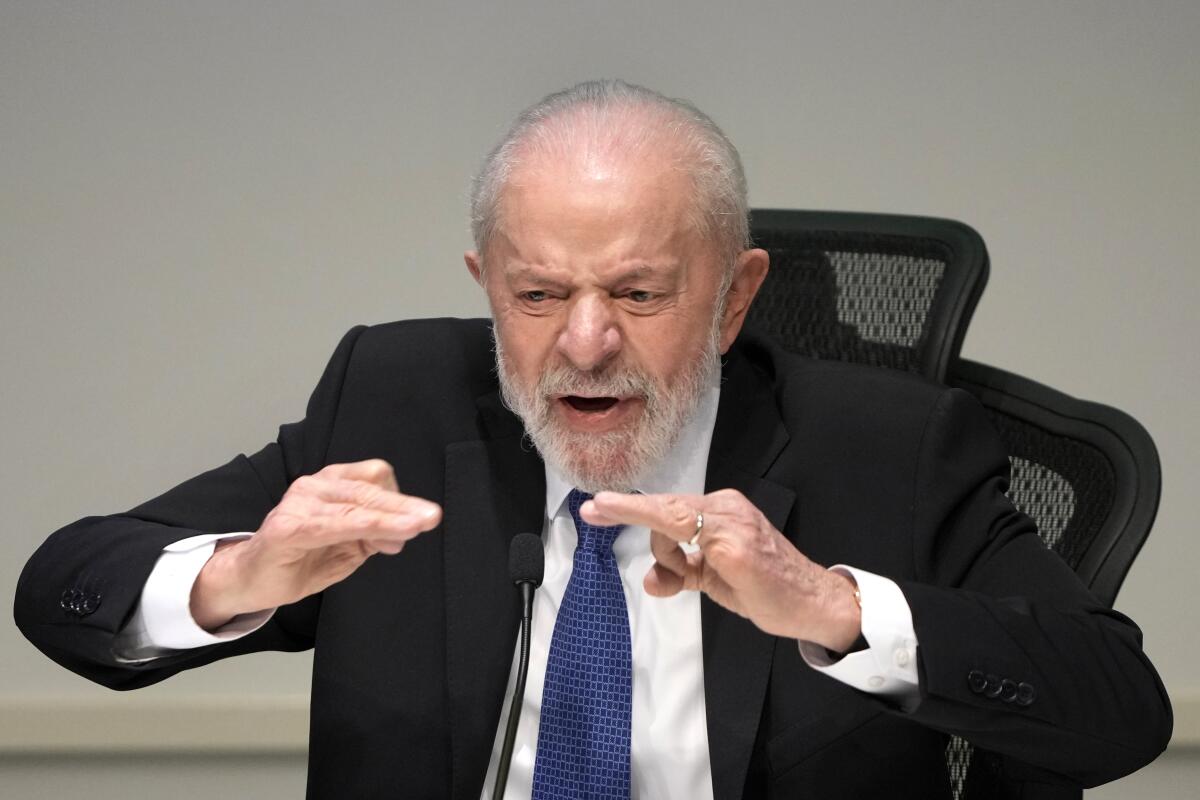Venezuelan opposition leader rejects Brazil’s idea of redoing presidential vote

- Share via
SÃO PAULO — Venezuelan opposition leader María Corina Machado on Thursday rejected a proposal from Brazil’s president that Venezuela hold a new presidential election following the contested results of last month’s vote.
Her comments came shortly after Brazilian President Luiz Inácio Lula da Silva said that he still doesn’t recognize President Nicolás Maduro as the winner of last month’s presidential election in Venezuela, and that his counterpart could call for a new vote “if he has good sense.” President Biden also expressed support for a new election.
Lula said Maduro owes an explanation to Brazilians and the rest of the world.
Machado said during a virtual news conference with Argentine media that redoing the election would be “an insult” to the Venezuelan people. If a second election were held and Maduro still didn’t accept the results, she asked, “do we go for a third one?”
Brazil is by far South America’s largest nation and shares one of Venezuela’s longest land borders. Unlike many other nations that have either recognized Maduro or Edmundo González Urrutia as the winner, the governments of Brazil, Colombia and Mexico have neither rejected nor accepted the declaration by Venezuela’s electoral authorities that Maduro won at the ballot box.
“Maduro still has six months left in his term. He is the president regardless of the election. If he has good sense, he could call upon the people of Venezuela, perhaps even call for new elections, create an electoral committee and allow observers from around the world to monitor,” Lula said in an interview with Radio T.
In a joint statement, the three countries called on Venezuela’s electoral body to release tens of thousands of vote tally sheets, considered the ultimate proof of results.
Under Lula, Brazil has been an important mediator, including in the Barbados Agreement reached in October, when Maduro’s administration and political opposition agreed on a new election that triggered relief from U.S. sanctions.
Celso Amorim, Lula’s closest international advisor and former foreign relations minister, went to Caracas in July to monitor the election. Speaking to a Senate committee Thursday morning, Amorim said that a new election would need to be verified in a solid and robust manner.
Venezuelan law allows for another vote whenever the National Electoral Council or judicial authorities annul an election found to be fraudulent or whose outcome was impossible to determine. The new election must take place within six to 12 months under the same conditions as the annulled vote and the same candidates must appear on the ballot.
Logistics, laws and costs aside, a new election would be a risky gamble for Maduro and his allies as July’s vote and subsequent protests showed they have lost support across the country and can no longer bank on a cadre of die-hard supporters, known as “Chavistas,” as well as public employees and others whose businesses or employment depend on the state to comfortably beat opponents.
Although electoral authorities declared Maduro the winner of the highly anticipated election, they have yet to produce detailed voting tallies to back up their claim. The opposition, however, revealed that it collected tally sheets from more than 80% of the 30,000 electronic voting machines nationwide, showing that Maduro lost by a more than 2-to-1 margin.
An AP review of the tally sheets released indicates that González won significantly more votes than the government has claimed. The analysis casts serious doubt on the official declaration that Maduro won.
The AP processed almost 24,000 images representing the results from 79% of voting machines, resulting in tabulations of 10.26 million votes. The processed tally sheets also showed González receiving more votes on 20,476 receipts compared with 3,157 for Maduro.
When Biden was asked Thursday in Washington whether he supports a new election in Venezuela, he said, “I do.” Biden did not elaborate, and the White House did not immediately provide more detail on the president’s brief remark.
Earlier Thursday, the White House had reiterated its call on the Maduro government to release data on the vote tally. White House national security spokesman John F. Kirby also said that the U.S. believes González was the top vote-getter.
“We do believe that Mr. González will have the majority of votes. We believe that through a number of ways, in a number of sources,” Kirby said. “But what’s really definitive is the actual voting data. And the fact that Mr. Maduro won’t release that data., certainly, I think speaks to, what must be his concern about... the results of that would transparently display.”
Sá Pessoa writes for the Associated Press. AP writers Regina García Cano in Caracas, Venezuela, and Joshua Goodman in Miami contributed to this report.
More to Read
Sign up for Essential California
The most important California stories and recommendations in your inbox every morning.
You may occasionally receive promotional content from the Los Angeles Times.










